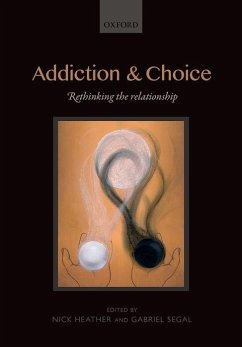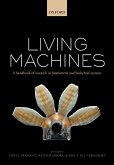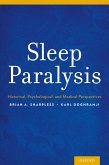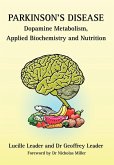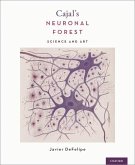Addiction and Choice
Herausgeber: Heather, Nick
Addiction and Choice
Herausgeber: Heather, Nick
- Gebundenes Buch
- Merkliste
- Auf die Merkliste
- Bewerten Bewerten
- Teilen
- Produkt teilen
- Produkterinnerung
- Produkterinnerung
Views on addiction are often polarised - either addiction is a matter of choice, or addicts simply can't help themselves. But perhaps addiction falls between the two? This book contains views from philosophy, neuroscience, psychiatry, psychology, and the law exploring this middle ground between free choice and no choice.
Andere Kunden interessierten sich auch für
![Electric Fields of the Brain Electric Fields of the Brain]() Paul L. Nunez (Emerit Emeritus Professor of Biomedical EngineeringElectric Fields of the Brain216,99 €
Paul L. Nunez (Emerit Emeritus Professor of Biomedical EngineeringElectric Fields of the Brain216,99 €![Living machines Living machines]() Living machines207,99 €
Living machines207,99 €![Sleep Paralysis Sleep Paralysis]() Brian A. Sharpless (Assistant Professor of Psychology and DirectorSleep Paralysis94,99 €
Brian A. Sharpless (Assistant Professor of Psychology and DirectorSleep Paralysis94,99 €![Parkinson's Disease Dopamine Metabolism, Applied Biochemistry and Nutrition Parkinson's Disease Dopamine Metabolism, Applied Biochemistry and Nutrition]() Lucille LeaderParkinson's Disease Dopamine Metabolism, Applied Biochemistry and Nutrition19,99 €
Lucille LeaderParkinson's Disease Dopamine Metabolism, Applied Biochemistry and Nutrition19,99 €![Cajal's Neuronal Forest Cajal's Neuronal Forest]() Javier DeFelipe (Prof, Prof, Instituto Cajal)Cajal's Neuronal Forest159,99 €
Javier DeFelipe (Prof, Prof, Instituto Cajal)Cajal's Neuronal Forest159,99 €![Handbook of Multiple Sclerosis Handbook of Multiple Sclerosis]() Handbook of Multiple Sclerosis90,99 €
Handbook of Multiple Sclerosis90,99 €![Headache Headache]() David Kernick (General Practitioner, St Thomas Medical Group, ExeteHeadache49,99 €
David Kernick (General Practitioner, St Thomas Medical Group, ExeteHeadache49,99 €-
-
-
Views on addiction are often polarised - either addiction is a matter of choice, or addicts simply can't help themselves. But perhaps addiction falls between the two? This book contains views from philosophy, neuroscience, psychiatry, psychology, and the law exploring this middle ground between free choice and no choice.
Produktdetails
- Produktdetails
- Verlag: Oxford University Press
- Seitenzahl: 518
- Erscheinungstermin: 2. Juni 2016
- Englisch
- Abmessung: 260mm x 183mm x 32mm
- Gewicht: 1142g
- ISBN-13: 9780198727224
- ISBN-10: 0198727224
- Artikelnr.: 47865991
- Herstellerkennzeichnung
- Libri GmbH
- Europaallee 1
- 36244 Bad Hersfeld
- gpsr@libri.de
- Verlag: Oxford University Press
- Seitenzahl: 518
- Erscheinungstermin: 2. Juni 2016
- Englisch
- Abmessung: 260mm x 183mm x 32mm
- Gewicht: 1142g
- ISBN-13: 9780198727224
- ISBN-10: 0198727224
- Artikelnr.: 47865991
- Herstellerkennzeichnung
- Libri GmbH
- Europaallee 1
- 36244 Bad Hersfeld
- gpsr@libri.de
Nick Heather is Emeritus Professor of Alcohol & Other Drug Studies at Northumbria University. After working as a clinical psychologist in the NHS, he developed the Addictive Behaviours Research Group at the University of Dundee. In 1987 he became founding Director of the National Drug and Alcohol Research Centre at the University of New South Wales. He returned to the UK in 1994 as Consultant Clinical Psychologist at the Newcastle City Health NHS Trust and as Director of the Centre for Alcohol and Drug Studies. He took up his present position on retirement from the NHS in 2003. He has published over 500 scientific articles, books, book chapters and other publications, with an emphasis on the treatment of alcohol problems and alcohol brief interventions. Gabriel Segal has a B.A. in Philosophy (first class honours) from University College London (1981), a B. Phil. (with overall distinction) from the University of Oxford (1983) and a PhD in Philosophy from M.I.T. (1987). He was Assistant Professor of Philosophy, University of Wisconsin-Madison (1987-89). He was Lecturer, Reader, then Professor of Philosophy at King's College, London (1989-present) and was Professor of Philosophy at the University of Reading (2012-2103). He is author (with Richard K. Larson) of Knowledge of Meaning: An Introduction to Semantic Theory MIT Press (1995); A Slim Book about Narrow Content, MIT Press (2000) and Twelve Steps to Psychological Good Health and Serenity: a Guide, Grosvenor House Publishing (2013).
* Section I: Introduction
* 1: Nick Heather: On defining addiction
* Section II: PHILOSOPHICAL FOUNDATIONS
* 2: Hanna Pickard and Serge H. Ahmed: How do you know you have a drug
problem? The role of knowledge of negative consequences in explaining
drug choice in humans and rats
* 3: Bennett Foddy: Addiction: the pleasures and perils of operant
behavior
* 4: Owen Flanagan: Willing Addicts? Drinkers, Dandies, Druggies and
other Dionysians
* 5: Thomas Crowther: Failures of Rationality and Self-Knowledge in
Addiction
* 6: David Papineau and Patrick Butlin: Normal and Addictive Desires
* 7: Edmund Henden: Addiction, Compulsion, and Weakness of the Will: A
Dual-Process Perspective
* 8: Nick Heather: Addiction as a form of akrasia
* SECTION III: PERSPECTIVES FROM NEUROSCIENCE
* 9: Richard Holton: Compulsion and choice in addiction
* 10: Marc D. Lewis: Choice in Addiction: A Neural Tug-of-War Between
Impulse and Insight
* 11: Scott J. Moeller and Rita Z. Goldstein: Assessing drug choice in
human addiction: Costs, benefits, and findings from current research
paradigms
* 12: Nasir H. Naqvi and Antoine Bechara: The role of the insula in
goal-directed drug seeking and choice in addiction
* SECTION IV: PERSPECTIVES FROM BEHAVIORAL ECONOMICS AND COGNITIVE
PSYCHOLOGY
* 13: George Ainslie: Palpating the elephant: Current theories of
addiction innlight of hyperbolic delay discounting
* 14: Howard Rachlin: Addiction as social choice
* 15: W. Miles Cox, Eric Klinger, Javad S. Fadardi: Nonconscious
motivational influences on cognitive processes in addictive behaviors
* 16: Andrew J. Vonasch, Heather M. Maranges, and Roy F. Baumeister:
Self-regulation, controlled processes, and the treatment of addiction
* SECTION V: IMPLICATIONS FOR TREATMENT, PREVENTION, AND PUBLIC HEALTH
* 17: Beth Burgess: The Blindfold of Addiction
* 18: James G. Murphy, Ashley A. Dennhardt, and Ali M. Yurasek:
Behavioral Economics as a Framework for Brief Motivational
Interventions to Reduce Addictive Behaviors
* 19: Jalie A. Tucker, Susan D. Chandler, and JeeWon Cheong: Role of
Choice Biases and Choice Architecture in Behavioral Economic
Strategies to Reduce Addictive Behaviors
* 20: Gabriel M. A. Segal: How an Addict's Power of Choice is Lost and
can be Regained
* SECTION VI IMPLICATIONS FOR THE PUBLIC UNDERSTANDING OF ADDICTION AND
FOR LEGAL RESPONSIBILITY FOR ADDICTIVE BEHAVIOR
* 21: Gene M. Heyman and Verna Mims: What addicts can teach us about
addiction: A natural history approach
* 22: Beth Burgess: How a stigmatic structure enslaves addicts
* 23: Stephen J. Morse: Addiction, Choice and Criminal Law
* SECTION VII CONCLUSIONS
* 24: Gabriel M. A. Segal: Ambiguous terms and false dichotomies
* 25: Nick Heather: Overview of addiction as a disorder of choice and
future prospects
* 1: Nick Heather: On defining addiction
* Section II: PHILOSOPHICAL FOUNDATIONS
* 2: Hanna Pickard and Serge H. Ahmed: How do you know you have a drug
problem? The role of knowledge of negative consequences in explaining
drug choice in humans and rats
* 3: Bennett Foddy: Addiction: the pleasures and perils of operant
behavior
* 4: Owen Flanagan: Willing Addicts? Drinkers, Dandies, Druggies and
other Dionysians
* 5: Thomas Crowther: Failures of Rationality and Self-Knowledge in
Addiction
* 6: David Papineau and Patrick Butlin: Normal and Addictive Desires
* 7: Edmund Henden: Addiction, Compulsion, and Weakness of the Will: A
Dual-Process Perspective
* 8: Nick Heather: Addiction as a form of akrasia
* SECTION III: PERSPECTIVES FROM NEUROSCIENCE
* 9: Richard Holton: Compulsion and choice in addiction
* 10: Marc D. Lewis: Choice in Addiction: A Neural Tug-of-War Between
Impulse and Insight
* 11: Scott J. Moeller and Rita Z. Goldstein: Assessing drug choice in
human addiction: Costs, benefits, and findings from current research
paradigms
* 12: Nasir H. Naqvi and Antoine Bechara: The role of the insula in
goal-directed drug seeking and choice in addiction
* SECTION IV: PERSPECTIVES FROM BEHAVIORAL ECONOMICS AND COGNITIVE
PSYCHOLOGY
* 13: George Ainslie: Palpating the elephant: Current theories of
addiction innlight of hyperbolic delay discounting
* 14: Howard Rachlin: Addiction as social choice
* 15: W. Miles Cox, Eric Klinger, Javad S. Fadardi: Nonconscious
motivational influences on cognitive processes in addictive behaviors
* 16: Andrew J. Vonasch, Heather M. Maranges, and Roy F. Baumeister:
Self-regulation, controlled processes, and the treatment of addiction
* SECTION V: IMPLICATIONS FOR TREATMENT, PREVENTION, AND PUBLIC HEALTH
* 17: Beth Burgess: The Blindfold of Addiction
* 18: James G. Murphy, Ashley A. Dennhardt, and Ali M. Yurasek:
Behavioral Economics as a Framework for Brief Motivational
Interventions to Reduce Addictive Behaviors
* 19: Jalie A. Tucker, Susan D. Chandler, and JeeWon Cheong: Role of
Choice Biases and Choice Architecture in Behavioral Economic
Strategies to Reduce Addictive Behaviors
* 20: Gabriel M. A. Segal: How an Addict's Power of Choice is Lost and
can be Regained
* SECTION VI IMPLICATIONS FOR THE PUBLIC UNDERSTANDING OF ADDICTION AND
FOR LEGAL RESPONSIBILITY FOR ADDICTIVE BEHAVIOR
* 21: Gene M. Heyman and Verna Mims: What addicts can teach us about
addiction: A natural history approach
* 22: Beth Burgess: How a stigmatic structure enslaves addicts
* 23: Stephen J. Morse: Addiction, Choice and Criminal Law
* SECTION VII CONCLUSIONS
* 24: Gabriel M. A. Segal: Ambiguous terms and false dichotomies
* 25: Nick Heather: Overview of addiction as a disorder of choice and
future prospects
* Section I: Introduction
* 1: Nick Heather: On defining addiction
* Section II: PHILOSOPHICAL FOUNDATIONS
* 2: Hanna Pickard and Serge H. Ahmed: How do you know you have a drug
problem? The role of knowledge of negative consequences in explaining
drug choice in humans and rats
* 3: Bennett Foddy: Addiction: the pleasures and perils of operant
behavior
* 4: Owen Flanagan: Willing Addicts? Drinkers, Dandies, Druggies and
other Dionysians
* 5: Thomas Crowther: Failures of Rationality and Self-Knowledge in
Addiction
* 6: David Papineau and Patrick Butlin: Normal and Addictive Desires
* 7: Edmund Henden: Addiction, Compulsion, and Weakness of the Will: A
Dual-Process Perspective
* 8: Nick Heather: Addiction as a form of akrasia
* SECTION III: PERSPECTIVES FROM NEUROSCIENCE
* 9: Richard Holton: Compulsion and choice in addiction
* 10: Marc D. Lewis: Choice in Addiction: A Neural Tug-of-War Between
Impulse and Insight
* 11: Scott J. Moeller and Rita Z. Goldstein: Assessing drug choice in
human addiction: Costs, benefits, and findings from current research
paradigms
* 12: Nasir H. Naqvi and Antoine Bechara: The role of the insula in
goal-directed drug seeking and choice in addiction
* SECTION IV: PERSPECTIVES FROM BEHAVIORAL ECONOMICS AND COGNITIVE
PSYCHOLOGY
* 13: George Ainslie: Palpating the elephant: Current theories of
addiction innlight of hyperbolic delay discounting
* 14: Howard Rachlin: Addiction as social choice
* 15: W. Miles Cox, Eric Klinger, Javad S. Fadardi: Nonconscious
motivational influences on cognitive processes in addictive behaviors
* 16: Andrew J. Vonasch, Heather M. Maranges, and Roy F. Baumeister:
Self-regulation, controlled processes, and the treatment of addiction
* SECTION V: IMPLICATIONS FOR TREATMENT, PREVENTION, AND PUBLIC HEALTH
* 17: Beth Burgess: The Blindfold of Addiction
* 18: James G. Murphy, Ashley A. Dennhardt, and Ali M. Yurasek:
Behavioral Economics as a Framework for Brief Motivational
Interventions to Reduce Addictive Behaviors
* 19: Jalie A. Tucker, Susan D. Chandler, and JeeWon Cheong: Role of
Choice Biases and Choice Architecture in Behavioral Economic
Strategies to Reduce Addictive Behaviors
* 20: Gabriel M. A. Segal: How an Addict's Power of Choice is Lost and
can be Regained
* SECTION VI IMPLICATIONS FOR THE PUBLIC UNDERSTANDING OF ADDICTION AND
FOR LEGAL RESPONSIBILITY FOR ADDICTIVE BEHAVIOR
* 21: Gene M. Heyman and Verna Mims: What addicts can teach us about
addiction: A natural history approach
* 22: Beth Burgess: How a stigmatic structure enslaves addicts
* 23: Stephen J. Morse: Addiction, Choice and Criminal Law
* SECTION VII CONCLUSIONS
* 24: Gabriel M. A. Segal: Ambiguous terms and false dichotomies
* 25: Nick Heather: Overview of addiction as a disorder of choice and
future prospects
* 1: Nick Heather: On defining addiction
* Section II: PHILOSOPHICAL FOUNDATIONS
* 2: Hanna Pickard and Serge H. Ahmed: How do you know you have a drug
problem? The role of knowledge of negative consequences in explaining
drug choice in humans and rats
* 3: Bennett Foddy: Addiction: the pleasures and perils of operant
behavior
* 4: Owen Flanagan: Willing Addicts? Drinkers, Dandies, Druggies and
other Dionysians
* 5: Thomas Crowther: Failures of Rationality and Self-Knowledge in
Addiction
* 6: David Papineau and Patrick Butlin: Normal and Addictive Desires
* 7: Edmund Henden: Addiction, Compulsion, and Weakness of the Will: A
Dual-Process Perspective
* 8: Nick Heather: Addiction as a form of akrasia
* SECTION III: PERSPECTIVES FROM NEUROSCIENCE
* 9: Richard Holton: Compulsion and choice in addiction
* 10: Marc D. Lewis: Choice in Addiction: A Neural Tug-of-War Between
Impulse and Insight
* 11: Scott J. Moeller and Rita Z. Goldstein: Assessing drug choice in
human addiction: Costs, benefits, and findings from current research
paradigms
* 12: Nasir H. Naqvi and Antoine Bechara: The role of the insula in
goal-directed drug seeking and choice in addiction
* SECTION IV: PERSPECTIVES FROM BEHAVIORAL ECONOMICS AND COGNITIVE
PSYCHOLOGY
* 13: George Ainslie: Palpating the elephant: Current theories of
addiction innlight of hyperbolic delay discounting
* 14: Howard Rachlin: Addiction as social choice
* 15: W. Miles Cox, Eric Klinger, Javad S. Fadardi: Nonconscious
motivational influences on cognitive processes in addictive behaviors
* 16: Andrew J. Vonasch, Heather M. Maranges, and Roy F. Baumeister:
Self-regulation, controlled processes, and the treatment of addiction
* SECTION V: IMPLICATIONS FOR TREATMENT, PREVENTION, AND PUBLIC HEALTH
* 17: Beth Burgess: The Blindfold of Addiction
* 18: James G. Murphy, Ashley A. Dennhardt, and Ali M. Yurasek:
Behavioral Economics as a Framework for Brief Motivational
Interventions to Reduce Addictive Behaviors
* 19: Jalie A. Tucker, Susan D. Chandler, and JeeWon Cheong: Role of
Choice Biases and Choice Architecture in Behavioral Economic
Strategies to Reduce Addictive Behaviors
* 20: Gabriel M. A. Segal: How an Addict's Power of Choice is Lost and
can be Regained
* SECTION VI IMPLICATIONS FOR THE PUBLIC UNDERSTANDING OF ADDICTION AND
FOR LEGAL RESPONSIBILITY FOR ADDICTIVE BEHAVIOR
* 21: Gene M. Heyman and Verna Mims: What addicts can teach us about
addiction: A natural history approach
* 22: Beth Burgess: How a stigmatic structure enslaves addicts
* 23: Stephen J. Morse: Addiction, Choice and Criminal Law
* SECTION VII CONCLUSIONS
* 24: Gabriel M. A. Segal: Ambiguous terms and false dichotomies
* 25: Nick Heather: Overview of addiction as a disorder of choice and
future prospects

